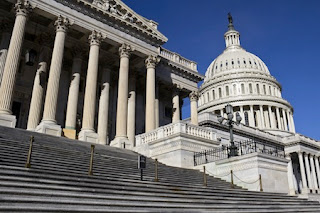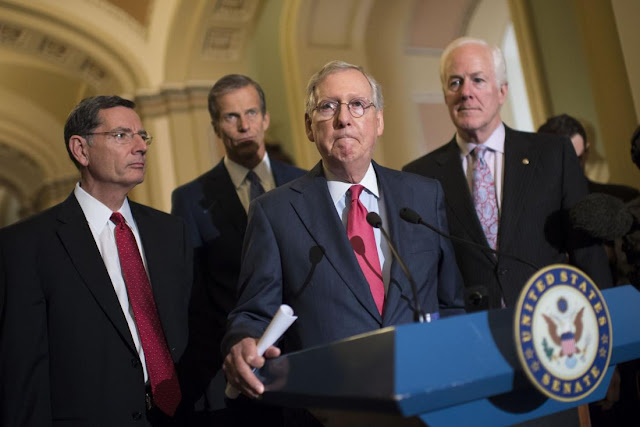"Most of the energy of political work is devoted to correcting the effects of mismanagement of government." ~ Milton FriedmanAnd even a correction of mismanagement seems to be grossly lacking these days! From furthering the mismanagement of Americans' health care to a continuous hollowing out of our military via social experimentation (and everything in between), what was rammed through a ruinous Democratic-led Congress has now rolled over to the current crop of apathetic congressional Republicans, most of whom unfortunately seem to care more about racking up another victory rather than doing the right thing in far too many instances.
Just for a moment, though, imagine if we had statesmen on Capitol Hill of THIS caliber (hat tip, Mark Levin)...
...like Marcus Tullius Cicero (106-43 BC), who explains justice (truth & virtue) as intrinsic to the state of nature:
"If the principles of Justice were founded on the decrees of peoples, the edicts of princes, or the decisions of judges, then Justice would sanction robbery and adultery and forgery of wills, in case these acts were approved by the votes or decrees of the populace. But if so great a power belongs to the decisions and decrees of fools that the laws of Nature can be changed by their votes, then why do they not ordain that what is bad and baneful shall be considered good and salutary? Or, if a law can make Justice out of Injustice, can it not also make good out of bad? But in fact we can perceive the difference between good laws and bad by referring them to no other standard than Nature: indeed, it is not merely Justice and Injustice which are distinguished by Nature, but also and without exception things which are honorable and dishonorable. For since an intelligence common to us all makes things known to us and formulates them in our minds, honorable actions are ascribed by us to virtue, and dishonorable actions are matters of opinion, and not fixed by Nature."And further argues that the source of justice, truth, virtue, etc. (morality) is natural law, permanent and supreme, unalterable by man or his institutions:
"True law is right reason in agreement with nature; it is of universal application, unchanging and everlasting; it summons to duty by its commands, and averts from wrongdoing by its prohibitions... It is a sin to try to alter this law, nor is it allowable to repeal any part of it, and it is impossible to abolish it entirely. We cannot be freed from its obligations by senate or people, and we need not look outside ourselves for an expounder or interpreter of it. And there will not be different laws at Rome and at Athens, or different laws now and in teh future, but one eternal and unchangeable law will be valid for all nations and at all times, and there will be one master and ruler, that is God, over us all, for he is the author of this law, its promulgator and its enforcing judge. Whoever is disobedient is fleeing from himself and denying his human nature, and by reason of this very fact he will suffer the worst punishment."...or how about Edmund Burke (1729-1797), who emphasizes another fundamental characteristic of the civil society - valuing human experience, tradition and custom. While supportive of the American Revolution, Burke was repulsed by the French Revolution of which he observed as led by elites and anarchists who had as their purpose not redress against tyrannical rule, but rather the utter destruction of society, traditions and customs:
"There is a manifest, marked distinction, which ill men with ill designs, or weak men incapable of any design, will constantly be confounding - that is, a marked distinction between change and reformation. The former alters the substance of the objects themselves, and gets rid of all their essential good as well as of all the accidental evil annexed to them. Change is novelty; and whether it is to operate any one of the effects of reformation at all, or whether it may not contradict the very principle upon which reformation is desired, cannot be known beforehand. Reform is not change in substance of in the primary modification of the object, but a direct application of a remedy to the grievance complained of. So far as that is removed, all is sure. It stops there; and if it fails, the substance which underwent the operation, at the very worst, is but where it was."Related link: The Heritage of Natural Law: Mark Levin on Rediscovering Americanism
"By this unprincipled facility of changing the state as often, and as much, and in as many ways, as there are floating fancies or fashions, the whole chain of continuity of the commonwealth would be broken. No one generation could link with the other. Men would become little better than the flies of a summer."
Wow. Refreshing, huh? If only the current guys would listen to not only our Founders, but also to those who inspired them!
Put another way in more modern, simplistic terms, imagine if these guys...
...were repealed & replaced with more of the guys who do harken back to our Founders' founders...
Related link: Senator Mike Lee: Why I Am Voting No on BCRA 2.0
Then we might truly be able to right the ship once and for all. But elections have consequences, so as long as we keep reelecting the squishy, professional politicians we've got, they're gonna continue to give us what we're getting, which thus far is nowhere near enough towards the plight of advancing liberty.





